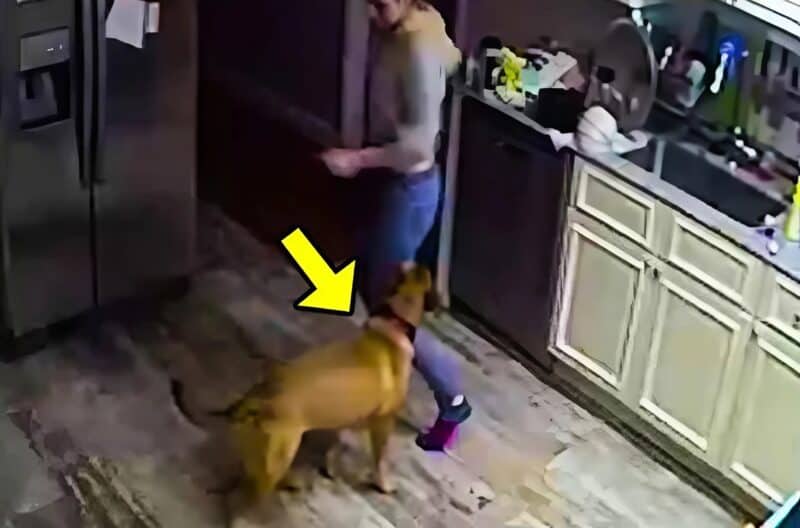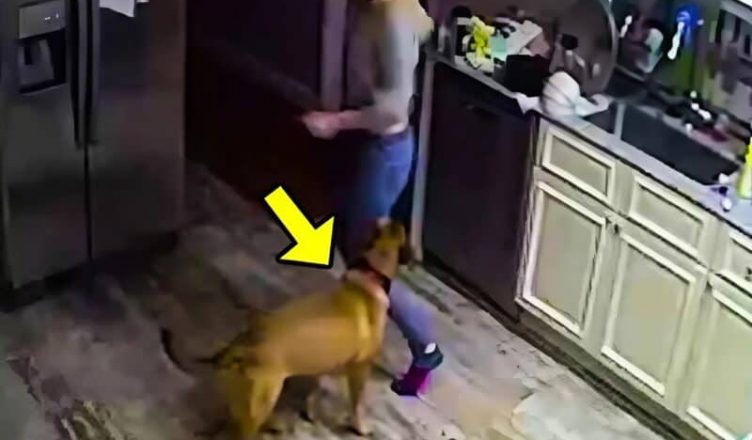On the footage, the wife walked to the counter, glanced around to make sure she was alone, and then pulled out a wooden kitchen spoon. Without hesitation, she struck the dog’s side. The animal recoiled in alarm. Another strike followed. Then another. Each one calculated, not impulsive.
The dog wasn’t being aggressive —
it was reacting to pain and fear.
The husband watched with a tightening in his chest, as if the floor beneath him had shifted. He rewound the video. Watched again. Slower this time.
He saw how the wife behaved:
not shocked, not startled, not frightened —
but calm, controlled, almost indifferent.
She would push the dog away, scold it sharply, and only then deliver the blow. The dog’s “attacks” weren’t attacks at all — they were desperate attempts to stop the harm.

And later, right before the husband arrived home, the wife carefully rehearsed her “victim” expression. She rubbed her arm, pressed her lips together, sighed deeply… almost like an actress getting into character.
Meanwhile, the dog lay rigidly on the floor, eyes lowered, every muscle tense.
This wasn’t a case of a dangerous animal.
It was a case of a frightened one.
He didn’t even remember when he stood up — he only realized he was already walking to the kitchen. The wife sat there, phone in hand, looking perfectly composed.
“So,” she asked lightly, “did you see the video? You understand now why it has to go?”
He looked at her for a long moment.
Then asked quietly:
“Why did you do it?”
Her eyebrows lifted.
“What?”
“Why did you hurt the dog?”
“What kind of accusation is that? I never—”
He held up the phone.
The video played.
Her hand rising.
The dog jumping away.
That was all it took.
Her face went completely still.
“This is being taken out of context,” she muttered.
“No,” he said calmly. “This is the context.”
He knelt beside the dog, placed a hand gently on its head. The animal leaned into him, trembling a little — but trusting him completely.
The wife stared.
“So you’re choosing the dog over me?”
He responded:
“I’m choosing compassion over cruelty.”
She didn’t argue further.
She simply collected her things, looked at him with a cold finality, and said:
“You’ll regret this.”
Then she left.
In the silence that followed, the dog slowly relaxed against his leg, as if finally breathing freely for the first time in weeks.
He filed for divorce shortly after.
Neighbors initially tried to interpret the situation differently, some feeling sorry for the wife — until a few saw the actual footage. And then the sympathy vanished.
People realized something important:
our character is defined not by how we behave when the world sees us —
but by how we act when we believe no one does.
In time, the dog’s gentle nature resurfaced. Yet occasionally, when someone raised a hand too quickly — even innocently — she would flinch. Traumatic memory lingers.
But now, surrounded by patience and kindness, she began to learn trust again.
And the man silently vowed:
she would never feel fear in her own home again.
Because the real threat had never been the dog —
it had been the person pretending to be the victim.
